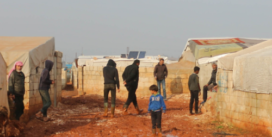- Winter Newsletter, 2025, Issue 14
- STUDENT ESSAY AND THE LIVED EXPERIENCE OF DISPLACEMENT AWARD CONTESTS
- Left out of the Levels Plan: A Call for Accessible Statistics for the Joint Assistance Sponsorship Program to Facilitate Research and Evaluation
- CARFMS2025: Canadian, Regional, and International Responses to Forced Migration
- LESSONS LEARNED FROM THE INDOCHINESE REFUGEE MOVEMENT IN CANADA IN THE 1970s AND 1980s
CARFMS 2023 STUDENT ESSAY CONTEST / ACERMF CONCOURS 2023 D’ESSAIS POUR LES ÉTUDIANTS

le français suit
The Canadian Association for Refugee and Forced Migration Studies (CARFMS) seeks to foster an independent community of scholars dedicated to the advancement and dissemination of Canadian refugee and forced migration research. The Association aims to engage students as active members of the Canadian refugee research community, and invites undergraduate, graduate and law students to participate in the 2023 CARFMS Student Essay Contest.
The CARFMS Student Essay Contest recognizes the most outstanding research produced by students in the field of refugee and forced migration studies. The authors of the shortlisted papers will be invited to present their work at the 15th Annual CARFMS Conference, which will take place May 29-31, 2023, at York University in Toronto, Ontario as part of the Congress of the Federation of Humanities and Social Sciences.
Papers submitted to the Student Essay Contest may address any issue relevant to refugee and forced migration studies, in Canada or elsewhere.
The selection committee will shortlist three authors in each category: 1) undergraduate students; 2) graduate and law students. Subject to peer review, high quality short-listed papers will be considered for publication as working papers on the CARFMS website.
Eligibility
- Participants in the contest must be members of CARFMS, or join the association in advance of the 2023 Conference.
- Participants must be Canadian students or international students registered at a Canadian university. Papers from any disciplinary background are welcome.
- The student must be the sole author of the submitted paper.
- The authors of shortlisted papers are encouraged to present their work in person at the 2023 CARFMS Conference, but students may participate in the competition even if they cannot attend the conference.
Application process and editorial guidelines
- Papers must be submitted on-line at http://carfms.org/student-essay-contest/ by 5:00 PM EST, March 3rd, 2023.
- Papers may be submitted in either English or French.
- Papers must not exceed 7,500 words. Please use 12-point font and standard margins.
- Submissions must include an abstract of no more than 150 words, setting out the main arguments or findings of the paper.
- Papers should follow appropriate referencing conventions.
- The papers will be evaluated through an anonymous review process. Please do not include any identifying information in the paper.
- Submissions that do not meet the basic editorial guidelines will not be reviewed by the assessment committee.
Any questions should be directed to:
Dr. Julie Young, Canada Research Chair (Tier 2) in Critical Border Studies and Assistant Professor, University of Lethbridge, julie.young@uleth.ca
L’Association Canadienne d’études sur les réfugiés et la migration forcée (ACERMF) cherche à encourager une communauté académique indépendante qui se consacre à l’avancement et la diffusion de la recherche canadienne sur les réfugiés et la migration forcée. L’Association vise à impliquer les étudiant.e.s comme membres actives et actifs de la communauté canadienne de recherche sur les réfugiés, et invite les étudiant.e.s du premier cycle, aux études supérieures et de droit à participer au Concours 2023 d’essais de l’ACERMF.
Le Concours d’essais pour étudiant.e.s reconnaît la recherche la plus remarquable réalisée par des étudiant.e.s dans le domaine des études sur les réfugiés et la migration forcée. Les auteurs des essais présélectionnés seront invité.e.s à présenter leurs travaux durant la 15ème Conférence Annuelle de l’ACERMF, qui se tiendra du 29 au 31 mai 2023 à l’Université York à Toronto, Ontario dans le cadre du Congrès des sciences humaines.
Les travaux soumis au Concours peuvent aborder toute question pertinente et en lien avec les études sur les réfugiés et la migration forcée, au Canada ou ailleurs.
Trois essais dans chaque catégorie – étudiant.e.s du premier cycle ; et étudiant.e.s des Facultés de droit et aux études supérieures – seront présélectionnés.
Après une revue de paires favorables, des essais de haute qualité seront considérés pour publication comme documents de travail de recherche au site web de l’ACERMF.
Éligibilité
- Les participant.e.s au concours doivent être membres de l’ACERMF, ou s’inscrire à l’Association avant la Conférence annuelle 2023.
- Les participant.e.s doivent être des étudiant.e.s canadiens ou des étudiant.e.s étranger.e.s inscrit.e.s à une université canadienne. Les travaux provenant de toute discipline seront les bienvenus.
- Les étudiant.e.s doivent être les seuls auteurs de l’essai soumis au concours.
- Les auteurs des essais présélectionnés sont encouragé.e.s à présenter leurs travaux en personne durant la Conférence Annuelle de l’ACERMF. Toutefois, les étudiant.e.s ne pouvant être présents à la Conférence seront éligibles à participer au concours.
Processus d’application et directives éditoriales
- Les essais doivent être soumis en ligne au : http://carfms.org/student-essay-contest/ avant 17h , le 3 mars 2023.
- Les essais peuvent être soumis en français ou en anglais.
- Les essais ne doivent pas dépasser 7,500 mots. Prière d’utiliser une police de 12 points et des marges ‘standard’.
- Les propositions d’essai doivent inclure un résumé de 150 mots présentant les principaux arguments ou résultats.
- Les essais doivent suivre un style standard de citation.
- Les essais seront évalués par un processus anonyme de révision. Prière de ne pas inclure des informations pouvant vous identifier dans le reste du document.
- Les propositions d’essai qui ne respectent pas les directives éditoriales ne seront pas révisées par le comité d’évaluation.
Pour toute question, veuillez communiquer avec :
Julie Young, PhD; courriel: julie.young@uleth.ca
